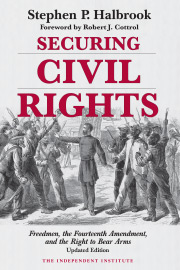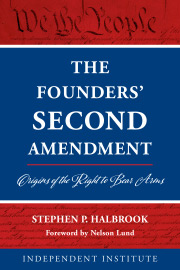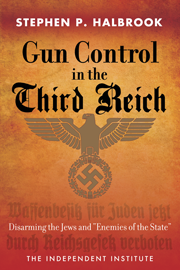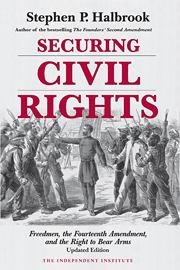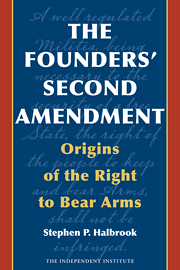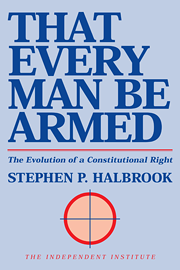Michael A. Bellesiles’ Arming America: The Origins of a National Gun Culture (Knopf 2000) is heralded as the death knell of the Second Amendment. The book never actually analyzes the meaning of the words "the right of the people to keep and bear arms shall not be infringed." Yet gun prohibitionists slavishly praise this book as the catalyst that will forever change the gun control debate.
Mr. Bellesiles claims that, before the Civil War, "the majority of American men did not care about guns. They were indifferent to owning guns, and they had no apparent interest in learning how to use them." Just as Josef Stalin doctored photographs to change history, artists of the early Republic must have inserted muskets over Colonial mantels that never held a firearm.
The premise of the book seems to be that not many people kept or bore arms and thus recognition of a right to do so in the Constitution is not important today. One could just as well argue that not many people had books back then either and thus the right to a free press should not be taken too seriously.
The thesis that few Americans owned firearms is based on Mr. Bellesiles’ examination of probate records in selected New England and Pennsylvania towns for 1765–1790. Only 14 percent of deceased persons had a firearm in the inventories of their estates, and half of these firearms were listed as broken. Mr. Bellesiles unrealistically assumes that fathers did not, before their deaths, give their firearms to their children.
To test this methodology, I examined copies of the original 1826 inventories of Thomas Jefferson’s three estates, which were auctioned off to pay debts. Just like Mr. Bellesiles said, the inventories were very meticulous, right down to the "2 sickles" valued at $1, "1 pair cotton sheets $1.25," and even some items "worth nothing." No mention of a single firearm. It was the same with his will.
Yet Jefferson was a lifelong firearm owner. At 25, he won "a shilling threepence" in a shooting match. He wrote Washington that "one loves to possess arms." His papers include dozens of transactions for purchase or repair of firearms. He bought or had built numerous fowling pieces and pistols. Mr. Bellesiles says that gunpowder was almost unavailable during the Revolution, but Jefferson bought 12 pounds in a single 1777 transaction.
Why weren’t Jefferson’s firearms in his estate inventories? He gave his Turkish pistols, which were "so well made that I never missed a squirrel at 30 yds. with them," to Dolly Madison’s son in 1816. We don’t know where the rest went, but a pair of pocket pistols he bought in 1786 are on display at Monticello today. With this single example, Mr. Bellesiles’ house of cards falls. But there is more.
Mr. Bellesiles claims that virtually no Americans of the Founding era hunted. Again consider the sage of Monticello. As a youngster, Jefferson dared not return home to his father without game in his bag. "Let your gun be the constant companion of your walks," Jefferson wrote his 15-year old nephew. Jefferson "approved of boys at 10 being given a gun and sent into the forest," recalled his grandson.
Jefferson attributed the victory at Bunker Hill "to our superiority in taking aim when we fire; every soldier in our army having been intimate with his gun from infancy." False, claims Mr. Bellesiles: Americans were terrible shots.
Mr. Bellesiles ridicules the marksmanship of the militiamen at Lexington and Concord because the 3,763 Americans shot only 273 British (just 95 Americans were hit by the trained Redcoat soldiers). Lt. Frederick MacKenzie of the Royal Welsh Fusiliers, who was there, disagreed: "These fellows were generally good marksmen, and many of them used long arms made for duck-shooting." By contrast, a 1999 Army Department study estimates that U.S. forces in Vietnam expended 50,000 rounds to cause a single enemy casualty.
Mr. Bellesiles writes that the Founders had no concept of a personal right to have arms. Again Jefferson refutes this attempt at de-construction. Jefferson proposed for the Virginia Constitution of 1776, "No freeman shall ever be de-barred the use of arms." This thinking would find its way into the federal Bill of Rights, which to this day guarantees the right to keep and bear arms.
Did Thomas Jefferson own a gun? Did the Founders take constitutional rights seriously? A historian with an agenda can pile inference on inference to answer these questions in the negative, but the historical reality was otherwise.
Were the Founding Fathers in Favor of Gun Ownership?
Also published in The Washington Times
Stephen P. Halbrook is a Senior Fellow at the Independent Institute and author of the Independent books The Right to Bear Arms, Gun Control in Nazi-Occupied France, Gun Control in the Third Reich, The Founders’ Second Amendment and That Every Man Be Armed.
Civil Liberties and Human RightsConstitutional LawFreedomGovernment and PoliticsGun ControlLaw and LibertyPhilosophy and ReligionPolitical History
Comments
Before posting, please read our Comment Policy.



